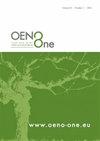How soil and climate variability within a vineyard can affect the heterogeneity of grapevine vigour and production
IF 2.2
3区 农林科学
Q3 FOOD SCIENCE & TECHNOLOGY
引用次数: 0
Abstract
This study aimed to determine how within-plot soil heterogeneity combined with yearly climate variability can promote the heterogeneity of vine growth at plot level, and which soil-climate parameters influence final yield and berry composition the most. An 8-year experiment was conducted on grapevine in two zones of a vineyard (1 ha) differentiated according to grapevine vigour as determined by NDVI: high vigour (HV) and low vigour (LV). The heterogeneity of the soil properties (depth, texture and composition), plant growth (shoots and roots) and plant production (yield components and berry composition) were determined at plot level. Compared to the LV zone, the HV zone was associated with deeper soils, higher soil water and nitrogen availability, CEC and montmorillonite/illite ratio. More extended root systems, higher vegetative growth and higher yield were observed in the HV zone compared to the LV zone. Drier and warmer vintages increased the difference in heterogeneity of vine growth and yield between the two zones. Berry composition (primary and secondary metabolites) also differed between HV and LV zones but seemed unconnected to vigour and mainly depended on soil-climate-plant interactions over the years. The heterogeneity of plant vigour within the vineyard mainly resulted from differences in root exploration, soil profile and composition (notably montmorillonite/illite ratio). The present study identified soil and crop factors that, depending on weather conditions, can be drivers for reducing the heterogeneity of plant development and improving productivity at vineyard level.葡萄园内的土壤和气候变化如何影响葡萄活力和产量的异质性
本研究旨在确定样地内土壤异质性和年气候变率如何促进样地水平葡萄生长的异质性,以及哪些土壤气候参数对最终产量和果实组成的影响最大。在一个葡萄园(1公顷)的两个区域进行了为期8年的试验,根据NDVI测定的葡萄活力分为高活力区(HV)和低活力区(LV)。在样地水平上测定土壤性质(深度、质地和组成)、植物生长(芽和根)和植物生产(产量组成和浆果组成)的异质性。与低电压区相比,高电压区土壤较深,土壤水氮有效性、CEC和蒙脱土/伊利石比较高。与低压区相比,高压区根系伸长率更高,营养生长更快,产量更高。干燥和温暖的年份增加了两个区域之间葡萄生长和产量异质性的差异。果实组成(初级和次级代谢物)在高低温区和低低温区也存在差异,但似乎与活力无关,主要取决于多年来土壤-气候-植物的相互作用。葡萄园内植物活力的异质性主要是由于根系探索、土壤剖面和成分(尤其是蒙脱石/伊利石比)的差异。目前的研究确定了土壤和作物因素,根据天气条件,可以成为减少植物发育异质性和提高葡萄园水平生产力的驱动因素。
本文章由计算机程序翻译,如有差异,请以英文原文为准。
求助全文
约1分钟内获得全文
求助全文
来源期刊

OENO One
Agricultural and Biological Sciences-Food Science
CiteScore
4.40
自引率
13.80%
发文量
85
审稿时长
13 weeks
期刊介绍:
OENO One is a peer-reviewed journal that publishes original research, reviews, mini-reviews, short communications, perspectives and spotlights in the areas of viticulture, grapevine physiology, genomics and genetics, oenology, winemaking technology and processes, wine chemistry and quality, analytical chemistry, microbiology, sensory and consumer sciences, safety and health. OENO One belongs to the International Viticulture and Enology Society - IVES, an academic association dedicated to viticulture and enology.
 求助内容:
求助内容: 应助结果提醒方式:
应助结果提醒方式:


